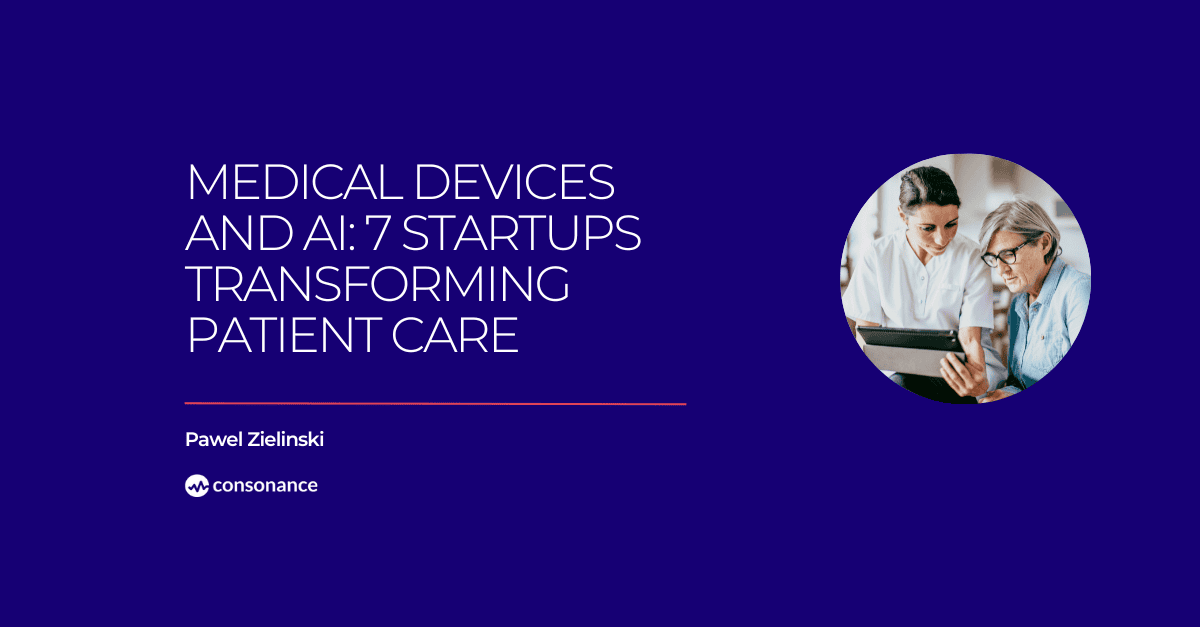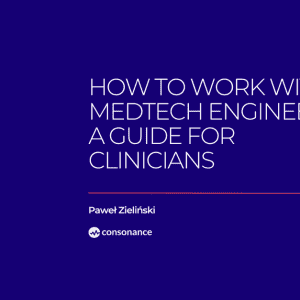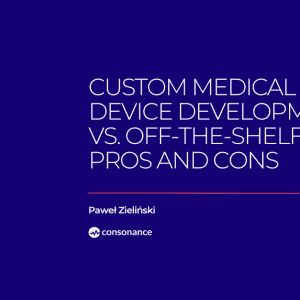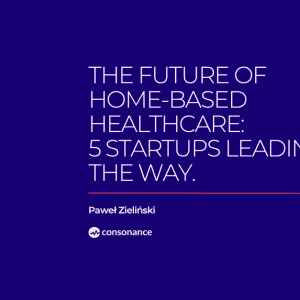Medical Devices and AI: 7 Startups Transforming Patient Care

Artificial intelligence has reached hospitals, doctors offices and our homes. At least in some cases – I have no doubts about it. But what exactly is possible when medical devices and AI are joining forces to help with patient monitoring, disease detection, and providing personalized care?
In this article, we introduce a curated list of seven startups that leverage medical devices and AI to improve or totally change the way healthcare works.
Meet the 7 Startups at the Intersection of Medical Devices and AI
- Emily.ai
Emily.ai has developed a solution designed to support patients with chronic obstructive pulmonary disease (COPD). COPD is a long-term inflammatory lung disease that makes it difficult to breathe. Its symptoms include shortness of breath, coughing, excess mucus, and wheezing. It is the most common chronic respiratory condition worldwide. Currently, treatment is limited to oxygen therapy.
However, there is no existing solution that integrates automatic oxygen administration with continuous monitoring, treatment recommendations, and real-time communication with healthcare providers. Emily.ai addresses this gap with a comprehensive, patient-centered system. It consists of wearable sensors, a mobile app, a smart wristband, an AI-powered cloud platform, and a medical dashboard for healthcare professionals. With more than 40 sensors, Emily.ai continuously tracks the patient’s condition and delivers personalized oxygen therapy tailored to the patient’s needs, location, health status, and activity level.
The AI-driven app is available to patients 24/7, analyzing data in real time and predicting symptom exacerbations up to 72 hours in advance. This holistic approach not only improves therapy but also ensures timely intervention and better communication between patients and medical teams.
- LightHearted AI
Lighthearted AI has developed an innovative solution that combines laser technology with advanced artificial intelligence. This technology enables the remote detection of biomarkers and the generation of fast, highly accurate diagnostic reports – all in a completely contactless way. The company has designed a next-generation digital stethoscope capable of detecting heart valve defects in just 10 seconds. Patient data is collected remotely, non-invasively, and fully automatically, without the need for a physician’s involvement.
The Lighthearted platform processes this data, generates a diagnostic report within one minute, and shares it directly with doctors. The solution also supports the discovery of new biomarkers, enables early diagnosis, and facilitates timely treatment with pharmaceutical interventions.
- AiDx Medical
AiDx Medical has developed AiDx NTDx, a multifunctional automated microscope designed to aid diagnosis of malaria, tuberculosis, and other tropical diseases directly at the point of care. The device is compact, durable, affordable, and compatible with existing workflows. An optional battery-powered version is available for use in off-grid settings. AiDx NTDx integrates custom-designed optics with an automated scanner offering three degrees of freedom. Its fast auto-focus system and built-in camera capture images of scanned samples without requiring manual assistance, only a microscope operator is needed to initiate the process.
Artificial intelligence then analyzes the recorded images, detecting parasites or bacteria, classifying them, and determining the severity of infection. This enables clinicians to evaluate treatment effectiveness. The system also includes efficient data storage and disease mapping features, organizing results into folders linked to unique identifiers and geospatial data to support tracking and surveillance.
- Maia Labs
Maia Labs has developed ColoMaia, an innovative AI-powered endoscope module. The device is compatible with any endoscopy tower and can increase polyp detection rates by up to 43%. ColoMaia provides real-time support by alerting physicians with an audible signal whenever a polyp is detected or missed. The system also assists with navigation during colonoscopy, including accurate identification of the cecum. It is designed for ease of use and enables a seamless training process for medical staff. By automatically generating medical reports, ColoMaia saves physicians valuable time and streamlines procedures.
Additional automated functions include video recording on/off control, secondary pilot withdrawal, and assessment of colon preparation. Other features include voice dictation with automatic transcription into reports, as well as management (BI) reporting that provides insights into the number of procedures performed, procedure types, and overall performance metrics.
- Brightmind.ai
Brightmind.ai has developed a home-use solution for migraine prevention. The device takes the form of a headset that delivers short, high-intensity magnetic pulses, non-invasively stimulating the brain by modulating neuronal activity and connectivity. These magnetic pulses induce electrical currents in the brain, which can either activate or inhibit neurons depending on the pulse frequency, intensity, and duration of stimulation. The therapy is supported by artificial intelligence. Over time, the device collects data to determine the necessary adjustments, enabling personalized and optimized brain stimulation for each user.
- Nilocas Ltd.
Nilocas Ltd. is developing a non-invasive medical device for detecting coronary heart disease (CHD). Currently, CHD is typically diagnosed using angiography, an invasive procedure that requires inserting a cannula into an artery and often involves exposure to high levels of radiation. Nilocas device takes the form of a chest pad that records the sounds of turbulent blood flow caused by narrowed coronary arteries. Equipped with built-in microphones and accelerometers, it detects subtle sounds associated with blood flow disturbances.
The test takes only 10 minutes and can be performed in both nursing homes and hospitals. After recording, artificial intelligence analyzes the data and provides a result indicating the presence or absence of coronary artery disease. This approach ensures that only patients with detected abnormalities undergo angiography, potentially reducing costs and patient risk significantly.
- Pryfiber
Pryfiber has developed a flexible microendoscope made from a single multimode optical fiber. This innovative technology allows endoscopy in extremely small spaces, such as joints, coronary arteries, and brain blood vessels. Traditional endoscopes are often too large, thick, and rigid, which can limit clinical decision-making. Thanks to the ultra-thin diameter of a single optical fiber (less than 300 microns), imaging is minimally invasive.
A deep learning based AI algorithm enables real-time calibration of the endoscope, reorganizing light to produce accurate images. This technology supports both microscopic cellular imaging and standard endoscopic tissue imaging, opening new possibilities for precise diagnostics in previously hard to reach areas.

Meet the 7 Startups at the Intersection of Medical Devices and AI.

Medical devices and AI are joining forces for better healthcare.
Conclusion
The combination of medical devices and AI opens up possibilities that traditional hardware alone could never achieve. These devices not only collect data but also process it in real time, enabling truly personalized treatment in the moment while minimizing the risk of errors. Of course, alongside these benefits come challenges such as ensuring access to high-quality data, cybersecurity and building trust among physicians and patients in adopting innovative solutions.
What are your thoughts on mixing medical devices and AI? Maybe you are working on an exciting solution in this field? Let’s talk and move your idea ahead of the curve!
Let us know!






